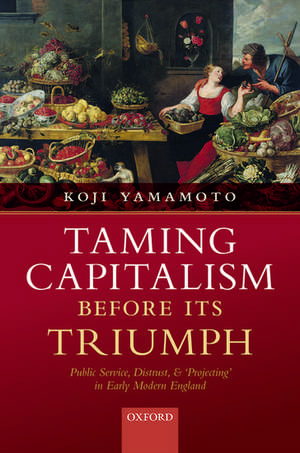Taming Capitalism before its Triumph: Public Service, Distrust, and 'Projecting' in Early Modern England
Autor Koji Yamamotoen Limba Engleză Hardback – 17 mai 2018
| Toate formatele și edițiile | Preț | Express |
|---|---|---|
| Paperback (1) | 195.54 lei 10-16 zile | +63.64 lei 7-13 zile |
| OUP OXFORD – 5 aug 2021 | 195.54 lei 10-16 zile | +63.64 lei 7-13 zile |
| Hardback (1) | 703.99 lei 31-37 zile | |
| OUP OXFORD – 17 mai 2018 | 703.99 lei 31-37 zile |
Preț: 703.99 lei
Preț vechi: 843.55 lei
-17% Nou
Puncte Express: 1056
Preț estimativ în valută:
134.71€ • 146.78$ • 113.51£
134.71€ • 146.78$ • 113.51£
Carte tipărită la comandă
Livrare economică 12-18 aprilie
Preluare comenzi: 021 569.72.76
Specificații
ISBN-13: 9780198739173
ISBN-10: 0198739176
Pagini: 356
Ilustrații: 4 black & white illustrations
Dimensiuni: 164 x 243 x 27 mm
Greutate: 0.7 kg
Editura: OUP OXFORD
Colecția OUP Oxford
Locul publicării:Oxford, United Kingdom
ISBN-10: 0198739176
Pagini: 356
Ilustrații: 4 black & white illustrations
Dimensiuni: 164 x 243 x 27 mm
Greutate: 0.7 kg
Editura: OUP OXFORD
Colecția OUP Oxford
Locul publicării:Oxford, United Kingdom
Recenzii
Overall, Yamamoto's project to find a middle way between grand syntheses and specialized case studies is a success. The book combines substantial archival research, attention to detail, and nuance with a capacity to highlight more general patterns in the evolution of projecting. It reconstructs the wide assortment of people and institutions involved in projecting, as well as the troubled and uncertain political environment in which this activity took place.
[M]edievalists will benefit by thinking with him both about method and theory. He builds his case meticulously, systematically moving between different genres of sources, different archives, different actors, and different moments in time, all the while trying to combine cultural history with institutional, economic, and political history."
Yamamoto's superb book ... offers a fascinating account of how the productive capacities of economics initiatives were promoted and its destructive tendencies contained. ... [It] deserves much applause and a readership consisting not only of early modernists, economic historians, cultural historians, and historians of economic thought but also, and perhaps in particular, business historians.
Koji Yamamoto's timely and important new book ... offers an important lesson for our own times, that a fully unregulated capitalist market will inevitably tend toward abuse and inequality, promoting private gain over the public good. Only when the free market is tamed can it function properly, and that process is both active and visible.
Taming Capitalism is, as it sets out to be, a useful corrective to whiggish narratives of English improvement. ... The book is strongest in describing these changes, persuasively moving between closely analysed case studies and a broader picture.
immensely pleasing and impressive ... Yamamoto's book resembles the bullseye of a huge diagram. Its larger intersecting circles include the history of innovation and regulation; elite and popular literary sources; and legal, political, and social history. In smaller circles there is history of science, religious history, the analysis of memory, sociologist Erving Goffman's work on stigma, and more. The outcome of these intersections is ... a persuasively coherent extension and revision of important prior work on economic innovation by Joel Mokyr and Paul Slack ... This is a magisterial book that should be read not only for its substantive claims but as a methodological model for a deeply nuanced account of seventeenth-century developments.
[An] ambitious and yet meticulously researched book ... Yamamoto's willingness to tackle head on the grandest of narratives about early modern England signifies the extent of his ambitions. However, this is not at the expense of close contextualised reading of the early modern evidence, resulting in an impressive balance between detailed case studies and striking generalisations. ... Overall this is an impressive and indeed agenda setting work.
Koji Yamamoto's much-awaited book addresses how the impact of economic change upon society can be accommodated. It is a highly challenging work in both senses of the word, taking aim at several established lines of argument by bringing economic, social, political, and cultural approaches together into a wider synthesis. ... it deserves to find a very wide readership.
[M]edievalists will benefit by thinking with him both about method and theory. He builds his case meticulously, systematically moving between different genres of sources, different archives, different actors, and different moments in time, all the while trying to combine cultural history with institutional, economic, and political history."
Yamamoto's superb book ... offers a fascinating account of how the productive capacities of economics initiatives were promoted and its destructive tendencies contained. ... [It] deserves much applause and a readership consisting not only of early modernists, economic historians, cultural historians, and historians of economic thought but also, and perhaps in particular, business historians.
Koji Yamamoto's timely and important new book ... offers an important lesson for our own times, that a fully unregulated capitalist market will inevitably tend toward abuse and inequality, promoting private gain over the public good. Only when the free market is tamed can it function properly, and that process is both active and visible.
Taming Capitalism is, as it sets out to be, a useful corrective to whiggish narratives of English improvement. ... The book is strongest in describing these changes, persuasively moving between closely analysed case studies and a broader picture.
immensely pleasing and impressive ... Yamamoto's book resembles the bullseye of a huge diagram. Its larger intersecting circles include the history of innovation and regulation; elite and popular literary sources; and legal, political, and social history. In smaller circles there is history of science, religious history, the analysis of memory, sociologist Erving Goffman's work on stigma, and more. The outcome of these intersections is ... a persuasively coherent extension and revision of important prior work on economic innovation by Joel Mokyr and Paul Slack ... This is a magisterial book that should be read not only for its substantive claims but as a methodological model for a deeply nuanced account of seventeenth-century developments.
[An] ambitious and yet meticulously researched book ... Yamamoto's willingness to tackle head on the grandest of narratives about early modern England signifies the extent of his ambitions. However, this is not at the expense of close contextualised reading of the early modern evidence, resulting in an impressive balance between detailed case studies and striking generalisations. ... Overall this is an impressive and indeed agenda setting work.
Koji Yamamoto's much-awaited book addresses how the impact of economic change upon society can be accommodated. It is a highly challenging work in both senses of the word, taking aim at several established lines of argument by bringing economic, social, political, and cultural approaches together into a wider synthesis. ... it deserves to find a very wide readership.
Notă biografică
Koji Yamamoto is a historian of early modern England. He has spent twelve happy years in the UK, taking master's and doctoral degrees in York, and subsequently working at universities in London (King's College London), St Andrews, Edinburgh, and Cambridge. He was a British Academy Postdoctoral Fellow between 2012 and 2014. From April 2016, he has been an Assistant Professor in Business History at the Faculty of Economics, the University of Tokyo.





















